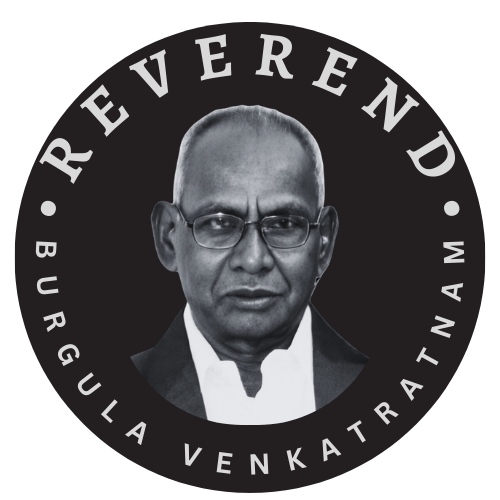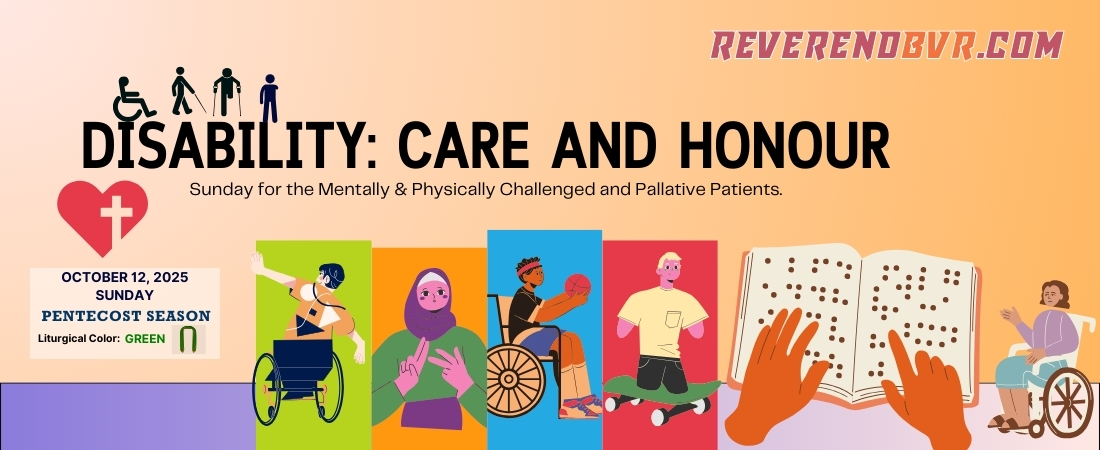This sermon, “Disability: Care and Honour,” reclaims the biblical vision of dignity rooted in the Imago Dei, challenging the Church to move beyond pity toward covenantal inclusion, justice, and honour for persons with disabilities and palliative conditions. Through the stories of Mephibosheth, Aeneas, and Christ’s healing ministry, it calls the Church to become a community where vulnerability is not sidelined but cherished as a revelation of God’s grace.
Sermon Title: Disability: Care and Honour
Occasion: October 12, 2025, Sunday | A Sunday Dedicated to Persons with Disabilities and Palliative Patients
Textual Foundations: 2 Samuel 9:1–13 | Psalm 146 | Acts 9:32–35 | Mark 3:1–6.
Original Language Reflections (For deeper study, refer to the Table of Hebrew and Greek Terms in Section 8 of the sermon).
Website: www.reverendbvr.com
1. Introduction: Dignity Reimagined
In a cultural landscape where dignity is too often tethered to autonomy, capacity, and utility, the Christian vision insists upon something more radical: the irreducible worth of every human being, rooted not in function but in Imago Dei—the image of God (Gen. 1:27).
Today, as we consider disability, chronic illness, and the challenges of palliative care, we do so not from a place of pity, but of theological recognition. In the Gospels and throughout Scripture, we encounter a God who does not bypass suffering but dwells within it—who calls the Church to be a community of honour rather than exclusion.
I. Covenant Kindness and the Marginalised Body: David and Mephibosheth (2 Samuel 9:1–13)
The narrative of Mephibosheth, grandson of Saul, offers a striking portrayal of grace extended toward a disabled person in a hierarchical and patriarchal society. The Hebrew word ḥesed—often translated “kindness” (v.1, 3)—conveys more than sentiment; it denotes covenantal fidelity, a deeply ethical commitment to mercy and restoration.
David’s decision to bring Mephibosheth to his table and restore his land and honour is not merely personal loyalty. It is a theological statement: in the kingdom that anticipates God’s reign, honour is conferred not based on strength but on covenant.
Theological Reflection: The doctrine of Imago Dei demands that the Church does not merely accommodate people with disabilities but honours them as integral to the ecclesial body. David’s gesture models the Church’s vocation to be a community of ḥesed—where hospitality is restorative and inclusion is essential.
II. The God Who Uplifts: A Psalmic Vision of Justice (Psalm 146)
Psalm 146 presents a divine kingship rooted in justice: “The Lord lifts up those who are bowed down” (v.8).
The contrast between divine faithfulness and the transience of human leaders (vv.3–4) is both theological and political. God is portrayed not only as sovereign but as one whose reign is revealed in advocacy for the vulnerable.
Theological Insight: Disability theology—advanced by scholars like Nancy Eiesland and Amos Yong—emphasizes the agency and theological significance of disabled persons. The psalm affirms that God’s glory is most profoundly revealed not through strength, but through solidarity. Thus, caregiving is not ancillary to Christian life—it is participation in God’s own character.
III. Healing as Witness: Aeneas and the New Creation (Acts 9:32–35)
Peter’s healing of Aeneas shows divine compassion and eschatological power. The Greek verb ἰᾶταί (“heals”) signals holistic restoration, echoing Isaiah’s vision of a renewed creation.
Yet, the deeper movement lies in the response: “All who lived in Lydda and Sharon turned to the Lord” (v.35).
Aeneas’s restored body becomes a testimony—not to his worthiness, but to God’s redemptive initiative.
Theological Implication: Healing in Scripture is not a spectacle of divine preference but a sign of the Kingdom’s inbreaking. The Church must avoid idolizing either healing or suffering. Persons with disabilities are not theological problems to solve but theological witnesses—embodying the paradox of divine strength in human weakness (2 Cor. 12:9).
IV. Mercy Over Sacrifice: Jesus and the Sabbath Healing (Mark 3:1–6)
Jesus heals a man with a withered hand—publicly—as a confrontation against a system that prioritizes legality over human flourishing. The silence of the onlookers (v.4) is damning. Jesus, moved by both anger and grief, acts decisively to restore not only the man’s hand but his dignity.
Theological Reflection: This episode reminds us that religion devoid of compassion becomes oppressive. Jesus reveals a God who does not delay mercy. Any Church that sidelines the disabled fails to reflect this Sabbath ethic of grace and restoration.
V. Living Theology: The Church’s Call to Honour
The challenge before us is not merely pastoral, but theological. If the Church is to reflect the Body of Christ, it must also reflect the diversity of that Body—including disabled, chronically ill, and palliative members.
What does this entail?
- Accessibility: Structures must embody inclusion, not just compliance.
- Participation: Leadership must welcome gifts that emerge through, not in spite of, disability.
- Pastoral Care: Accompaniment in suffering is central, not secondary.
- Theological Education: Must reject ableist assumptions and celebrate theological diversity.
- Societal Witness: The Church must challenge cultural narratives that devalue lives marked by fragility—especially around euthanasia and end-of-life ethics.
As Jean Vanier reminds us: “The weak are not a burden to be managed, but a mirror in which we see our common humanity—and perhaps, most clearly, the face of Christ.”
2. Understanding Disability and Its Causes
Disability includes any condition—physical, mental, sensory—that limits movement, perception, or activity. It may be congenital or acquired, temporary or permanent.
In both Scripture and modern society, disability has often been misunderstood, even stigmatized. As Christians, we must approach it with compassion, clarity, and honour.
3. The Biblical Understanding of Disability – Biblical figures with disabilities include:
- Moses (speech impediment – Exod. 4:10)
- King Saul (mental distress – 1 Sam. 16:14–23)
- Mephibosheth (lameness – 2 Sam. 9:13)
- The blind man healed by Jesus (John 9:1–7)
These figures were not cursed or worthless. Rather, Scripture teaches that all human conditions fall under God’s sovereign purpose.
4. Theological Causes of Disability in Scripture
- For God’s Glory
(John 9:1–7) – “This happened so that the works of God might be displayed in him.” - Due to Sin or Disobedience
(Lev. 21:16–23) – Specific to ceremonial law, not a universal moral claim. - Divine Judgment
(Num. 12:10–15; 2 Chron. 26:19–21) – Cases that warn against pride, not normative theology. - The Fallenness of the World
(Luke 14:13–14; Matt. 11:5) – A consequence of broken creation, not divine abandonment. - Spiritual Discipline
(2 Cor. 12:7–10) – Paul’s “thorn in the flesh” reminds us of divine grace in human limits. - Compassion and Mercy
(Matt. 15:30–31; Mark 7:32–35) – Jesus’ ministry reframes disability as a context for divine mercy.
5. Disability in the Modern World: A Call to Care and Honour
Today, causes of disability include genetics, accidents, illness, and aging. Yet often, it is stigma and exclusion that most deeply wound.
As the Church, we are called to:
- Dismantle barriers
- Celebrate all abilities
- Resist cultural devaluation
- Bear witness to God’s Kingdom where all belong
6. Conclusion: Becoming a Community of Honour
Let us not be a Church that merely tolerates disability, but one that celebrates and honours it as part of God’s creative and redemptive work.
Let us embody the grace of David, the justice of the Psalmist, the compassion of Peter, and the courage of Christ.
In the Body of Christ, there is no lesser member—only those through whom God’s glory shines differently.
7. Closing Prayer
Gracious and Merciful God, You formed each of us in your image and called us good. We lift before you today our brothers and sisters who live with disabilities, chronic illness, or who are receiving palliative care. Grant them comfort, dignity, joy, and strength. Forgive us for the times we have ignored, excluded, or undervalued them. Make your Church a place of true welcome, where each person is honoured as a member of your body, and where care is given not as charity but as kinship. As Jesus healed the broken and welcomed the weary, so may we—your people—extend hands of justice, compassion, and love. Through Christ our Lord, who healed, welcomed, and reigns. Amen.
8. Learn Words from the Original Scriptures (For deeper understanding and meditation on today’s theme) :
| S.No | Word ( Click on each term to view its lexical details) | Language | Meaning |
| 1 | חֶסֶד (ḥesed) | Hebrew | Covenant love: mercy, loyalty, grace |
| 2 | ἰᾶται (iātai) | Greek | He heals; restoration |
9. Bibliography:
- Nancy L. Eiesland, The Disabled God: Toward a Liberatory Theology of Disability (Nashville: Abingdon Press, 1994).
- Amos Yong, The Bible, Disability, and the Church: A New Vision of the People of God (Grand Rapids: Eerdmans, 2011).
- John Swinton and Brian Brock, eds., Disability in the Christian Tradition: A Reader (Grand Rapids: Eerdmans, 2012).
- Walter Brueggemann, First and Second Samuel, Interpretation (Louisville: Westminster John Knox Press, 1990).
- R.T. France, The Gospel of Mark, The New International Greek Testament Commentary (Grand Rapids: Eerdmans, 2002).
- C.K. Barrett, The Acts of the Apostles: A Shorter Commentary (London: T&T Clark, 2002).
- Jean Vanier, Becoming Human (New York: Paulist Press, 1998).
- Holy Bible, New Revised Standard Version (NRSV), Anglicized Edition (London: HarperCollins, 1989).
© 2025 ReverendBVR.com | High-Academic Sermon Series, 2025.
Content licensed under Creative Commons Attribution-NonCommercial-NoDerivatives 4.0 International (CC BY-NC-ND 4.0). You are free to share — copy and redistribute the material in any medium or format with proper attribution. No commercial use or modifications allowed without explicit permission.
For further sermons and biblical reflections, please visit 🌐 www.reverendbvr.com/sermons

